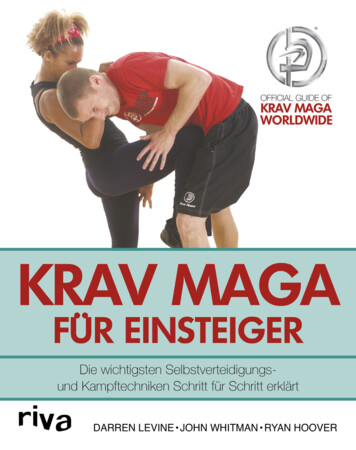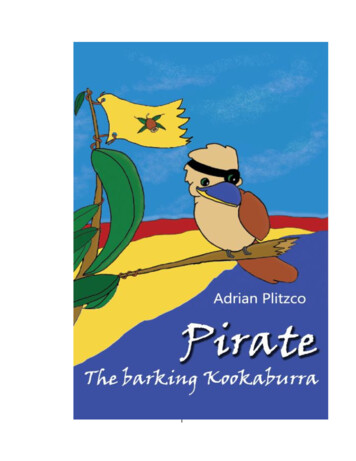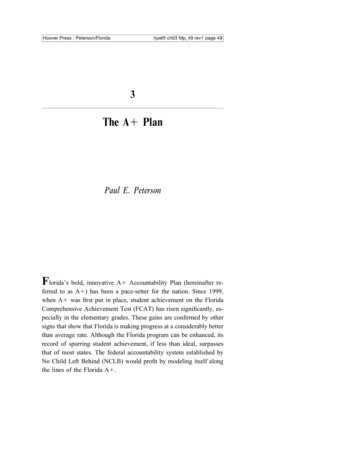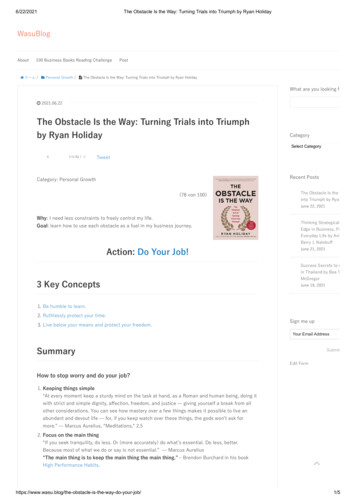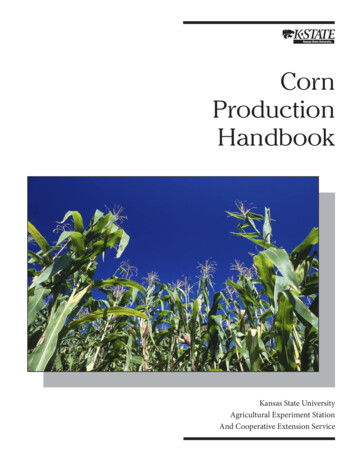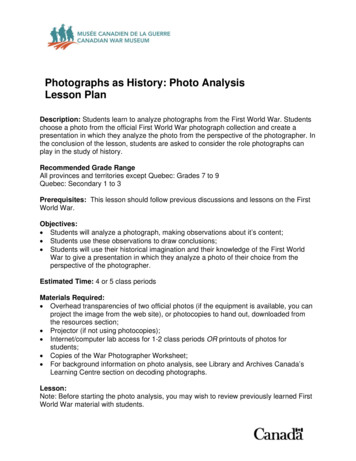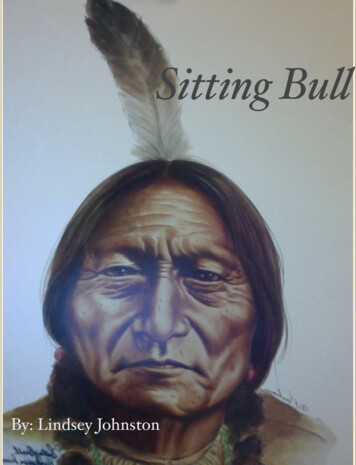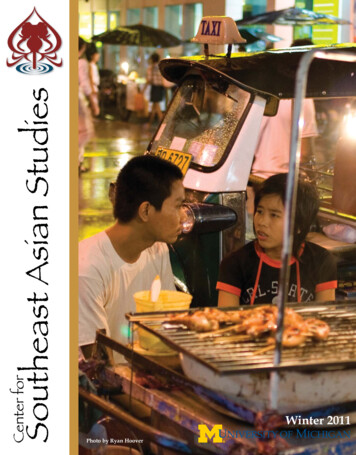
Transcription
Winter 2011Photo by Ryan Hoover
From the DirectorThis has been an exciting and full year at the Center for Southeast Asian Studies. Throughoutthe year we celebrated the Center’s 50th anniversary. Events included the returnof several of our alumni as participants in our Friday-at-noon lectures, as well as acelebration of the 50th anniversary of the Peace Corps, which involved several U-M alumniwith connections to Southeast Asia. A highlight of the year was the CSEAS 50th anniversaryconference and reunion held in October (see next page). It was wonderful to see so manyalumni, faculty, and students gathered to honor the Center and all those who made it possible,and to anticipate the opportunities ahead. You can view recordings of the reunion roundtable and conferenceproceedings at www.ii.umich.edu/cseas/events/av.This year also marked significant development milestones for the Center. In November I joined with manyof our alumni in Thailand for a dinner to celebrate raising US 1 million for the Amnuay-Samonsri ViravanEndowment for Thai Studies (see page 12). The event was hosted by Dr. Amnuay and Khunying SamonsriViravan and the University of Michigan Alumni Association in Thailand. We also established a new endowmentfor the University of Michigan Gamelan, made possible by a bequest from Rosannah Steinhoff. I want to thankall those who have contributed to these and any of the Center’s other initiatives this year. We could not carryout our work without your support.We have also been active on the programming front. This academic year we have organized a record number ofevents, including a new Southeast Asian film series, the reunion, an international conference, our ongoing Fridayat-noon series, and a jazz-gamelan fusion concert featuring Balinese guitarist I Wayan Balawan (see page 3-4).We have been pleased to have two wonderful visitors with us. Professor FX Widaryanto, one of Java’s mostfamous dancers, has been in residence for the entire academic year, preparing students and communitymembers for our annual gamelan and Javanese dance concert—this year an original production based on theAmir Hamzah stories. We have also had the pleasure of having Professor Mohd. Anis Md. Nor from the Universityof Malaya in residence this winter. Professor Nor is a world-renowned ethnochoreographer and a Michigan alum(see page 3).Let me thank all those who have worked so hard this year in support of the Center for Southeast Asian studiesat Michigan, particularly Professor Christi-Anne Castro, whose term as Associate Director is coming to a close,and the members of the executive committee, Deirdre de la Cruz, Nancy Florida, Fe Susan Go, MontatipKrishnamra, Nick Rine, and Carla Sinopoli. Finally, we have been pleased to have Kate Wright join CSEAS asprogram manager. Kate joins a wonderful support staff, including Nancy Becker, Esther Lee, Cindy Middleton,and Charley Sullivan. Thanks to each one of them for their hard work and dedication.Best wishes,Allen Hicken, DirectorRegents of the University of Michigan: Julia Donovan Darlow, Laurence B. Deitch, Denise Ilitch, Olivia P. Maynard, Andrea Fischer Newman, Andrew C. Richner, S. Martin Taylor,Katherine E. White, Mary Sue Coleman ex officio.The University of Michigan, as an equal opportunity/affirmative action employer, complies with all applicable federal and state laws regarding nondiscrimination and affirmativeaction. The University of Michigan is committed to a policy of equal opportunity for all persons and does not discriminate on the basis of race, color, national origin, age, maritalstatus, sex, sexual orientation, gender identity, gender expression, disability, religion, height, weight, or veteran status in employment, educational programs and activities, andadmissions. Inquiries or complaints may be addressed to the Senior Director for Institutional Equity, and Title IX/Section 504/ADA Coordinator, Office of Institutional Equity, 2072Administrative Services Building, Ann Arbor, Michigan 48109-1432, 734-763-0235, TTY 734-647-1388. For other University of Michigan information call 734-764-1817.
In October 2010, we celebrated our 50th anniversary with a reunion for all our alumni, students, faculty, visitors, andfriends. It was quite the event: we kicked off with an international conference focused on Southeast Asian studies acrossthe disciplines, followed by an open house at the residence of Linda Lim and Pete Gosling, and continued the next daywith a series of events, including a panel discussion and tours of the University of Michigan’s museums. To cap it all off,we hosted a banquet dinner preceded by music from the U-M gamelan ensemble.Alumni gather for gamelan musicand mingling at Palmer CommonsNancy Florida & Judith Beckerenjoying the gamelanEd and Jade Vander VeldeFrom left: Allen Hicken, John Whitmore,Pete Gosling, Judith Becker, Gayl Ness, andLinda Lim.Gigi Bosch-Gates, Sebastian Dettman& Will RedfernAndrew Goss & John CiorciariPhotos by Esther Lee2
Visitors to CSEASCSEAS was lucky enough to host two visiting faculty members on campus this year, bothof whom are no strangers to Ann Arbor. As part of a year-long Islam and Performing Artsinitiative, FX Widaryanto taught Javanese dance and presented an original choreography ofthe Amir Hamzah story titled Love Flows: An Islamic Dance Drama. Amir Hamzah, the uncleof the prophet Muhammad, is a popular figure across the Muslim world, including in Java.FX Widaryanto is faculty at Bandung Institute for the Arts (STSI) and one of Java’s leadingchoreographers and dancers.FX Widaryanto and his wife, Sri Saeni SadmiantiCSEAS welcomed Mohd. Anis Md. Nor to campus in the winter semester. He taughtContemporary Issues in Southeast Asia, CSEAS’ introductory course for undergraduates,providing them with a thoroughly engaging view of issues facing researchers who workin Southeast Asia today. Many of our faculty participated in this course, making it acomprehensive introduction to the field. He also lectured in our Friday lecture series,participated in the Islam and Performing Arts conference, continued to work on his longstanding collaboration with Patricia Matusky-Yamaguchi (‘80) on traditional music andmusicality in Malaysia, and taught a mini-course on Islam and the Performing Arts in SoutheastAsia. He has been a dynamic addition to the Southeast Asian studies community.FX Widaryanto in costume as Amir HamzahI Wayan Balawan and two members of his band, Batuan Ethnic Fusion,teamed up with two local jazz musicians, Olman Piedra and AdamMeinerding, for an evening of jazz-gamelan fusion as part of the U-MMuseum of Art Jazz Series. Balawan packed the house and, with naturalshowmanship, entertained audience questions about his customdesigned double-neck guitar and Balinese gamelan.I Wayan Balawan plays his double-neck guitarI Nyoman Suwida & I Nyoman Suaisana, members of Batuan EthnicFusion, play at UMMA3
On CampusThe Gedney Collection at the U-M LibraryProvides the Key to Translating Ancient Thai Epic TaleThe Tale of Khun Chang Khun Phaen is an incomparable classic in Thai language, a folk epic that combines socialpanorama with grand storytelling, a love triangle, and a tragic death. Developed through oral tradition in the 17thcentury, it was written down in the 19th century, with two kings among its authors.Chris Baker and Pasuk Phongpaichit, two leading scholars on Thailand, recently translated it in its entirety. They reliedon the U-M Library’s Gedney Collection to complete their translation. They used the 1890 Wat Ko edition of the epic, theworld’s only complete set in 42 small books. These volumes were bequeathed to the U-M Library by late U-M professorand famed linguist William Gedney. We owe our appreciation to Southeast Asian bibliographer, Fe Susan Go, who, asone of her first projects at U-M, oversaw the materials’ preservation through microfilm. Because of her foresight, thesematerials can be used by scholars the world over without fear of damage. CSEAS and the U-M Library co-hosted a lectureand discussion of the translation by Chris Baker and Pasuk Phongpaichit, along with a workshop on translation forgraduate students.The Legacy of Dr. Martin Luther King, Jr.: A Global MessageCSEAS participated in the campus-wide January 2011 Symposium in honor of Dr. Martin LutherKing, Jr. by inviting human rights activist from Cambodia, Theary Seng, to campus. ThearySeng is the founder of the Cambodian Center for Justice and Reconciliation and the Center forCambodian Civic Education. She is also the first recognized victim-civil party to confront KhmerRouge leaders in a court of international law, and, as it happens, a graduate of the University ofMichigan Law School.Ms. Seng lost her parents and siblings to the Khmer Rouge when she was a small child. Herreiteration of Dr. King’s message of peace only through justice was both poignantly heartfelt and piercingly analytical.She spent two full days on campus, giving two lectures on the legacy of Dr. King’s message and participating in a filmscreening and discussion of Who Killed Chea Vichea? (Loud Mouth Films, 2010). This was CSEAS’ second screening of thispowerful film, which traces the impunity and violence with which the Cambodian government restricts the rights of itsworkers to organize. Ms. Seng was joined by U-M Law professor Nick Rine and Ford School professor John Ciorciari, whooffered their insight into contemporary Cambodian politics.Deputy Chief of Mission Sek Wannamethee, RoyalThai Embassy, with Montatip Krishnamra’s Thailanguage classes. The Deputy Ambassador cameto Ann Arbor to celebrate the 50th anniversaryof the Peace Corps in 2010. The first Peace Corpsvolunteers from U-M went to Thailand.4
Faculty NewsAgustini (Asian Languages and Cultures) continues to be very involved in the development of Indonesian instruction inthe U.S. through the State Department’s Critical Language Scholarship program and collaborative university projects. Sheorganized the Center’s Southeast Asian Film series and received funding from U-M’s Center for Global and InterculturalStudy to take undergraduates to Indonesia this summer.Richard Atienza (Asian Languages and Cultures) enjoyed his first year teaching U-M students and also managed tofind time for professional development. He participated in the Interagency Language Roundtable training in Monterey,California and in a workshop in Madison, Wisconsin, to develop oral proficiency guidelines for Filipino. He will alsorepresent U-M at the University of the Philippines-Baguio City’s national summit on Filipino language.Christi-Anne Castro (School of Music, Theater, and Dance) spoke on the state of music scholarship on the South Pacificat a UCLA conference. She also accepted a position on the editorial board of Asian Music, the academic journal of theNational Society for Asian Music.John Ciorciari (Ford School of Public Policy) besides co-organizing CSEAS’ 50th Anniversaryconference, traveled to Jakarta in December and to Siem Reap, Cambodia in March as part of his AsiaSociety Fellowship. In Siem Reap, he attended a conference focused on building bridges betweenyoung scholars in Southeast Asia and the United States. In February 2011, he presented a paper atthe University of Pittsburgh on regional responses to the rise of Chinese naval influence in the IndianOcean and South China Sea. His book, The Limits of Alignment: Southeast Asia and the Great PowersSince 1975 (Georgetown University Press) came out in fall 2010.John Ciorciari at CSEAS’ 50th Anniversary Conference.Nancy Florida (Asian Languages and Cultures) was named director of the Islamic Studies Program (ISP), a unit in theInternational Institute, and in that capacity organized, with Susan Walton, a conference on Islam and Performing Arts. Herappointment to ISP reflects the growing awareness among scholars of Islam of the importance of Southeast Asia to their field.Kathy Ford (School of Public Health) traveled to Thailand for several months beginning in February. She visited theInstitute for Population and Social Research at Mahidol University to work on a number of projects related to HIV andmigrant populations in Thailand. These included post-traumatic stress disorder and other health impacts of unrest on thepopulation in southern Thailand.Beth Genné (School of Music, Theater, and Dance), in addition to playing in the gamelan ensemble at CSEAS’ 50thAnniversary Reunion and in the annual gamelan concert, gave a paper at a London conference on Dame Ninette de Valois,the founder of the Royal Ballet in England, in April.Webb Keane (Anthropology) was a visiting professor at Cambridge University in May 2010,where he organized a conference on religion and morality in Southeast Asia. He also gavelectures at Gadjah Mada University, Yogyakarta, Indonesia; Australian National University; andthe Institute for Human Sciences, Vienna, Austria.Webb Keane confers with Melani Budianta at CSEAS’ 50th Anniversary Conference.John Knodel (Emeritus, Sociology) continues his research on HIV/AIDS and aging populationsin Thailand and Cambodia. He spent the winter semester in Thailand and made frequent trips to Cambodia to coordinatea network of researchers of the Michigan Center for the Demography of Aging at the Institute for Social Research. Thisteam recently completed a collaborative analysis comparing Thailand and Cambodia to be published in the journal AIDSCare.5
Victor Lieberman (History) attended a conference near Angkor on the Impact of Climate on the Ancient Mekong Basinin January sponsored by Columbia University. He is also writing a paper on the influence of climate on the history ofmainland Southeast Asia, c. 800-1830 with Professor Brendan Buckley of the Lamont Doherty Earth Observatory atColumbia University.Rudolf Mrázek (History) will present a paper on Dutch texts on colonial internment camps in the Dutch East Indies at the2011 Conference on Colonial and Post-Colonial Connections in Dutch Literature in Berkeley this September.Paz Buenaventura Naylor (Linguistics, retired), gave a talk at the Syntax Support Group Meeting in the U-M Departmentof Linguistics in March.Gayl Ness (Emeritus, Sociology) spent the winter semester as a visiting professor in the School of Social Sciences,Universiti Sains Malaysia, Penang. There he has given lectures and guest-taught while enjoying his time in the country thatstarted off his fieldwork.Thuy’Anh Nguyen (Asian Languages and Cultures) presented at the GUAVA workshop, a group dedicated to Vietnameselanguage instruction, at Yale last fall. She also presented at the UC Language Consortium Conference in April 2010. Shecontinues to take students regularly to Vietnam, and has a trip planned for this summer.Dean Yang (Ford School of Public Policy, Economics) received a grant from the International Policy Center in the FordSchool of Public Policy to continue his research on how jobseekers in the Philippines find information.Susan Walton (Residential College) organized a conference on Islam and Performing Arts with the support of CSEAS andthe Islamic Studies Program. She also put on the annual gamelan concert, this time with the artistic direction of visitingartist FX Widaryanto.Emil Robles and JanineOchoa, February, 2011We welcomed Janine Ochoa and Emil Charles Robles for their brief stay on campus thisFebruary. Janine is assistant professor of Anthropology at University of the Philippines and aspecialist in zooarchaeology. She worked in the Museum of Zoology while she was here. Emil isa research associate at the Archaeological Studies Program of the University of the Philippinesand conducts spatial analysis using GIS. He worked on the Guthe Collections in the Asia Divisionof the Museum of Anthropology. The two are Luce/ACLS grantees in East and SoutheastAsian Archaeology and Early History. They found the collection at U-M remarkable for thecompleteness of its artifacts and enjoyed themselves in Ann Arbor, despite the snowstorms.Janine noted especially Ann Arbor’s vibrant but small-town feel and the warm welcome she gotfrom Carla Sinopoli. This is the second time U-M has received a Luce/ACLS grantee to use thePhilippines Collection.Susan Walton sings with U-M gamelan ensembleat CSEAS’ Reunion, Palmer Commons6
Student NewsSaul Allen (Asian Languages and Cultures) has spent the academic year in Jakarta with the support of a Fulbrightfellowship. His dissertation topic focuses on new historical narratives emerging in post-reformasi Indonesia.Radaphat (Pae) Chongthammakun (Information Science) produced two papers from her 2010 research in Thailand,funded by a Thai Studies grant from CSEAS.Dashini Jeyathurai (English) finished her preliminary exams this semester. She also will publish an article in the AsianJournal of Women’s Studies (2010/16-3) and contribute a chapter regarding the Malaysian Tamil “rubber estate girl” toan edited collection by Adeline Koh (PhD ‘08 Comparative Literature) and Yu- Mei Balasingamchow called TroublesomeWomen in Asia: The Politics of Gender in Singapore and Malaysia.Alyson Jones (Ethnomusicology), former member of the U-M gamelan ensemble and student of Judith Becker andChristi-Anne Castro, won a 2010 ProQuest Distinguished Dissertation Award from the Rackham Graduate School for herdissertation on Tunisian women’s ensembles, titled Playing Out: Women Instrumentalists and Women’s Ensembles inContemporary Tunisia.Cynthia Marasigan (History), a member of the Philippine Study Group Student Association while she was at U-M, filed herdissertation ‘Between the Devil and the Deep Sea’: Ambivalence, Violence, and African American Soldiers in the PhilippineAmerican War and Its Aftermath in August 2010. She is a postdoctoral fellow in the Asian American Studies Program atthe University of Illinois at Urbana-Champaign.Dominic Nardi (Political Science) has three articles coming out soon. He wrote an entry onenvironmental law in Southeast Asia for the Berkshire Encyclopedia of Sustainability, and will havean article about constitutional courts in Burma in the Australian Journal of Asian Law, and anotherarticle about constitutional courts in the Philippines for the Columbia Journal of Asian Law.Dominic Nardi asks a question at the CSEAS reunionPirasri Povatong (Architecture and Urban Planning) successfully defended his dissertation, Building Siwilai:Transformation of Architecture and Architectural Practice in Siam during the Reign of Rama V, 1868 – 1910, in January,2011. Professor Gavin Shatkin called his dissertation an “excellent piece of work.” Pirasri is on the architecture faculty atChulalongkorn University and recently authored a popular book on architecture in the era of Rama V.Charley Sullivan (History) is returning to the doctoral program in History. He received a Fulbright for research nextyear in Solo, Central Java. He danced in Love Flows: An Islamic Dance Drama, and presented a paper on the eruption ofMt. Merapi and political contention over the special political status of Yogyakarta, Indonesia, at the Eisenberg Centerfor Historical Study in February. He has an article forthcoming in Education About Asia. He continues to work at theInternational Institute.Jennifer Walker (Law) received an International Institute Individual Fellowship to work as a summer legal associate at theDocument Center of Cambodia.7
Winter semester has been an active time for both undergraduates and graduate students in Southeast Asian Studies. Weenjoyed a plethora of cultural nights sponsored by student associations, starting off with the Vietnamese Cultural nightand continuing with the Thai Cultural Night, Indonesian Cultural Night, and Malaysian Cultural Night. All of the eventsoffered regional food and cultural performances, put on by the students themselves.The Philippine Study Group Student Association (PSGSA) at U-M held its second annual symposium “Filipino Studiesand its Diaspora” in March. The symposium provided a space to assess the state of the field and its future directions, andconversations that developed in that space were wide-ranging and continue to develop. Organizer Sony Bolton (doctoralstudent in the Program for American Culture) said of the conference, “We believe that Michigan is the best place in thecountry to do work on Filipino Studies. We are fortunate to have a critical mass of faculty and graduate students hereworking in the area of Filipino Studies and so we hope to build intellectual momentum for our field at the University ofMichigan and beyond.”A group of our graduate students across disciplines organized Southeast Asia Reading Group (SEAR). They meet todiscuss each other’s work and read works of common interest. Current graduate students were energized by the FallConference, and, with the support of CSEAS and the Luce foundation, are organizing a follow-up graduate studentconference and workshop in fall semester 2011.Two recent graduates, Rachel Palmer (B.A., Near Eastern Studies and Political Science) and Katharine Barcy (B.A.,French and Linguistics), have both received Fulbright English Teaching Assistantships. Rachel Palmer is in Indonesia, andKatharine Barcy is in Vietnam.Chip Zuckerman and Dan Birchok atCSEAS conferenceLaichen Sun and Hao Jie at CSEAS conference8
Students AbroadAn Urban Planner in the Making:SEAS-215, the Center’s introductory course for undergraduates, inspires a professionBy Tanya Meftah, Southeast Asian Studies Major, 2012.I have spent the past five months living in Ho Chi Minh City, Vietnam participating inan academic year study abroad program run by the Council on International EducationExchange (CIEE). I attend the Vietnamese University of Social Science and Humanitieswhich is located minutes away from downtown Ho Chi Minh. Here, I study a rangeof topics from Vietnamese language, culture and literature to foreign policy andeconomics. Through this program, I also lived in Phnom Penh for one month andtraveled to the spectacular temples of Angkor in Siem Reap.Aside from learning in classrooms I have been enthusiastically delving into Vietnameseculture by meeting friends and living with a Vietnamese family. During my free timeTanya, on left in, VietnamI enjoy eating at one of the many street vendors who sell different varieties of food,fruits, coffee, and other products. Vietnam’s street culture forces interactions to be more personable. Vietnam is anexciting place to be living in, given its rapid progress of development. Every month the streets are decorated with a newoffice building or restaurant. Despite the crowded traffic of the city and its happenings, people are extremely friendly andmove at a slow yet efficient pace. In my eyes, the Vietnamese people are by far Vietnam’s most charming attribute.I became interested in Southeast Asian Studies in 2008 when I took Contemporary Issues in SEA (SEAS-215). I knew littleabout the region and figured that most Americans knew little as well. After taking that course, I wanted to become aconnection between SEA and the United States by raising awareness about impoverished living conditions there. I hope towork on rural development projects in Southeast Asia in the future. Living here, it is clear that there is a lot of work to bedone in this field. By studying Southeast Asian Studies at University of Michigan, I hope to attain my goal of becoming anurban planner and work in underdeveloped areas of the region.Building Bridges in Vietnam:A Hanoi University student reflects on her interactions with U-M studentsBy Yen Phung, International Studies, Hanoi University, VietnamI joined a dynamic group of American and Vietnamese students in the U-M GlobalIntercultural Experience for Undergraduates Vietnam 2010 trip to experienceVietnamese history and culture while getting actively involved in social work. Myperspective about the war comes from family elders and history class at high school,but emotions about war came up when I had the chance to visit museums andhistorical sites with American and Vietnamese students. On the one hand, I feltsorry for what had happened during the war but on the other hand I am so happythat post-war friendships can flourish between Vietnamese and Americans. WhatI really looked for after each visit is not war facts but how people recover to buildgood relationships for a better future.Photo credit: Yen Phung9
I really appreciate that the GIEU program created opportunities for both U-M and Hanoi University students to bringabout mutual understanding between two nations’ young generations.Social work was a very meaningful and important part of the trip. We rolled up our sleeves to plant trees in kindergartensin mountainous A Luoi and played with kids and painted a mural of their dreams in an orphanage center in Da Nang city.Such activities brought my friends and me closer to local people so we could understand their lives. As young people wecould contribute something both physically and spiritually to the children and local people we met. I treasure wonderfulmemories with GIEU 2010 and hope for this program to continue annually so that more students will be able to havegreat experiences and memories like I did.Language Lecturers Make All the DifferenceOften, the spark that ignites a lifetime of passion for Southeast Asia beginsin a language classroom or on a study abroad trip. Our language lecturers,Agustini (Indonesian), Richard Atienza (Filipino) Montatip Krishnamra (Thai),and Thuy’Anh Nguyen (Vietnamese) make all the difference when it comesto bringing Southeast Asian Studies to life for U-M’s undergraduates. Thissummer, they will lead trips to Indonesia, Thailand, and Vietnam.Agustini will lead 16 students on a GIEU trip to Java, focusing on ecology andlocal culture in a global economy. This will be her second trip with studentson the GIEU program, which draws students from across the university.Montatip Krishnamra will take eight undergraduates, from a range ofService learning in Vietnamdisciplines, to Thailand on a trip titled The Tastes of Thailand, studyingdifferent facets of Thailand: religions, foods, architecture, urban development and planning and foreign relations. This isher third trip with U-M students to Thailand. Last year, Thuy’Anh Nguyen took 12 U-M students and four Hanoi Universitystudents on a trip through Vietnam also through the GIEU program. They volunteered at various locations during theirjourney. This summer, she plans a similar trip, with 14 U-M students and 4 Hanoi University students, and they will travelto Vietnam and Laos, looking especially at development.Thuy’Anh Nguyen’s students in Vietnam, 201010
AwardsBeverly Shangkuan, graduate student in the School of Music focusing on choral conducting, won the Barbour Scholarshipfor 2011-12. Administered through Rackham Graduate School, this award was established in 1914 for women of thehighest academic caliber from Asia.The Albert D. Moscotti Best Paper Award went to Ismail Fajrie Alatas, for his paper “Apprehending Authority andGenealogy: A Tale of Two Haul in Contemporary Central Java.” Aji is a student in the Anthropology-History joint doctoralprogram.The Judith Becker Award for Outstanding Graduate Student Research on Southeast Asia went to Marco Garrido for hispaper “The Ideology of the Dual City: The Modernist Ethic in the Corporate Development of Makati City, Metro Manila.”Marco is a student in the Sociology doctoral program.Sebastion Dettman received a Rackham student research grant for travel to Indonesia. He’ll be doing fieldwork in Acehfor his thesis.Our four language faculty selected their best language students to receive CSEAS’ Best Language Student Award.The winners were: Sean-Matthew G. Calo, first-year Filipino; Xing Heng Kwa, second-year Thai; Minh Trieu Dang forVietnamese, and Nina Bhattacharya for second-year Indonesian.The following students won summer Foreign Language and Area Studies awards: Steve Beers (Vietnamese); SebastianDettman (Vietnamese); Mai Ze Vang (Thai).Thai Studies Research AwardsThese awards are made possible by the Amnuay-Samonsri Viravan Endowment for Thai StudiesDr. April Bigelow (School of Nursing), to support on-going collaborative research with doctors from the Thai Ministry ofHealth on non-communicable disease surveillance systems.Radaphat Chongthammakun, graduate student in the School of Information, for dissertation research on thecontributions of technology to government and international development.Professor John Ciorciari (Public Policy), to support a trip to Thailand in summer 2011 to focus on his research on theThai-Cambodian border dispute surrounding the ancient temple of Preah Vihear.Professor Kathleen Ford (Public Health), to support her collaborative research with faculty at Mahidol University on theimpact of violence on migration and well-being in Muslim populations of Southern Thailand.Emeritus Professor John Knodel (Sociology), to support his collaborative research with Chulalongkorn University Facultyof Nursing on aging, the elderly, and family support in Thailand.Jonathan Moore, graduate student in Urban Planning, for his summer 2011 internship at Dynamic EngineeringConsultants Company of Bangkok.Southeast Asia Research AwardsProfessor Christi-Anne Castro, for her participation in the University of Philippines School of Music Conference onSoutheast Asian music scholarship. Professor Castro will present a paper titled “Cultural Histories of Philippine Music,” atopic drawn from her forthcoming book, Musical Renderings of the Philippine Nation (Oxford 2011).Professor Rudolf Mrázek, for his participation in the 2011 University of California-Berkeley Conference on DutchLiterature. Professor Mrázek will present a paper titled “Beneath Literature? Imprisonment, Universal Humanism, and(Post)Colonial Mimesis.” The paper focuses on narratives of imprisonment and internment camp experiences in NewGuinea.Professor Fred Wherry, for a research trip to Thailand to continue work on his book project, Cultural Entr
Photo by Ryan Hoover. From the Director This has been an exciting and full year at the Center for Southeast Asian Studies. Throughout the year we celebrated the Center’s 50th anniversary.
